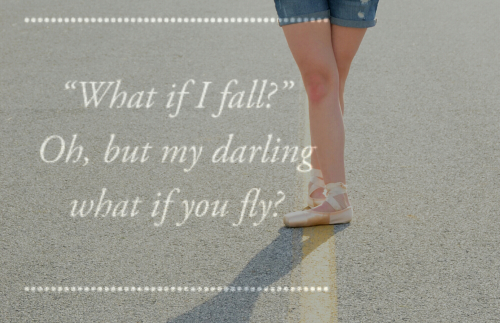Sweet Abi started taking a ballet/tap combination class this school year. She so adorably loves it. Every Friday morning, she gets all decked out (and even lets me fix her hair! #girlmomperks ) and after class, regales me with chatter about what her teacher did and what her friends said and all the movement games they played.
I love it for her.
When I was about 11, I took ballet when we lived in Texas. I think I took classes for about a year, and I remember loving the music, the movements. It was probably the first time I felt aware of my body and proud of its strength. But when my dance teacher told us that she wanted me to move up to the en pointe class, I got scared. She said I was younger than most of her pointe students, but she thought I would do well.
Even as a kid, I had a bad case of paralyzing perfectionism. The idea of going into a new class where I would be the youngest, the least experienced, and therefore probably the worst? No way, nuh-uh, not happening.
So I quit ballet.
That was the first of many hobbies and interests and activities I would begin, excel in, and abruptly quit.
Piano. Baton. Horseback riding. Sewing. Spanish.
I’m so thankful that my parents continued to let me try new things.
But I hate how my anxieties kept me from enjoying them longer. I wish I had been able to push myself past the part where the new skill got challenging. When I could no longer play my piano pieces through after a single practice session, I decided that meant I didn’t really have “an ear for music,” and I stopped taking lessons. After my first parade, I realized that other {older, experienced} baton twirlers could do a zillion more tricks than I could, and figured since I was still struggling with Move X, I’d probably never ever master my way up to Move Y. So I quit that, too.
The thing I’ve realized as an adult is that a lot of that tendency was due to my particular brain. Lots of gifted kids exhibit this little quirk: so many things come so easily to us upon first blush, that we get accustomed to everything coming naturally. We also get stuck in a feedback loop, where adults praise us for mastering things that seem very simple and effortless: therefore we think that effortless=praiseworthy. We see kids around us struggling with mastery and {yes, it’s true, we kinda can’t help it, many of us start off pretty egotistical and only learn empathy later} we assume that struggle=stupidity. Then, the first time we hit a task that’s going to require some WORK on our part, we spiral into cataclysmic thinking.
This is hard. -> Stuff is supposed to be easy for me. -> If it’s hard, that means I’m stupid {about this}. -> Feeling stupid is unfamiliar and uncomfortable. -> I’m going to quit {this} and do something where I’m comfortably smart, instead.
In my life right now, I’m figuring out how to push through that old pattern and not get caught on that spiral. Part of my new ability to do that comes from my meds, and I’m okay with that. The other part comes from some good therapy and learning some new types of self-talk. I had to figure out how to recognize the pattern, the voice in my head that whispers that LIFE AS WE KNOW IT WILL END IF MICHELLE FAILS AT SOMETHING PUBLICLY aaaaah eeeeeeek oh noes and I had to figure out how to approach opportunities rationally. There are certain key phrases my brain uses when it’s in that mode. They are my red flags that what I’m thinking and feeling isn’t really grounded in truth.
Having a friend or loved one to springboard ideas has also really helped me. A local bestie who knows me well, my husband – both people who can “gut check” me and will kindly but truthfully tell me when I’m hung up on old notions and operating out of fear.

One of the things I want desperately for my kids, then, is to grow up without the whisper of paranoid perfection in their heads. I pray that I’ll see the warning signs if they feel pressure to be perfect. I hope that I’ll know when to nudge them to keep going, to persevere, to take another step, to leap, to fly. And on the other hand, that I’ll know when they really do need to heed their inner voice and lay something down, take a step back, stop.
I don’t want Abi to stick with ballet because I have visions of her onstage beside Misty Copeland someday. I want her to stick with ballet for as long as it makes her happy, and if at some point it doesn’t, I hope I’ll be able to help her find another outlet that does bring her joy.



1 thought on “Tiny Dancer”